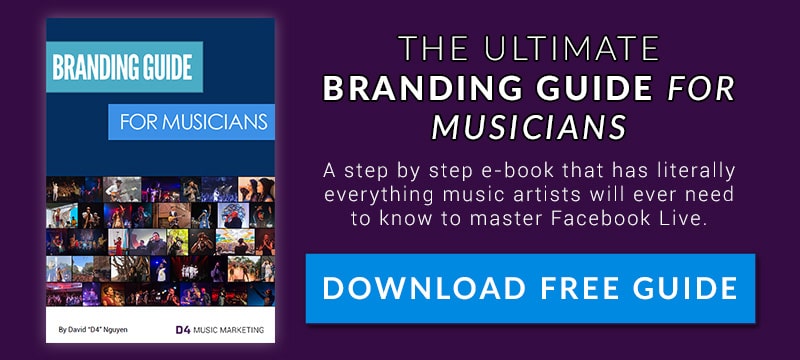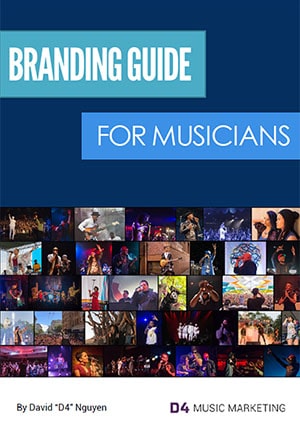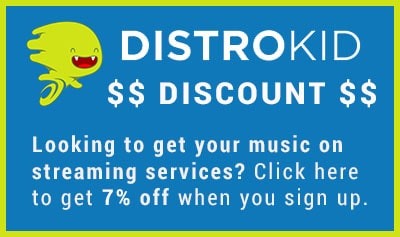
If you’ve read my first blog about the importance of branding for musicians and some basic terminology, then you’re ready to start laying the foundation for your own brand.
One of the most important assets you have is your brand, and your brand’s effectiveness is determined by how well you are able to connect with people on an emotional level. Why? Because not everyone will listen to your music when they come across it. Instead, they will have to make decisions about you based on your name, online presentation, bios, descriptions and everything else that relates to you. If these aspects don’t get their attention or resonate with their identity, then they are less likely to listen to your music.
In this blog, I will go over the 4 general steps that are essential to help you build your own brand.
Step 1 – Develop Self-Awareness
One of the most important things you can do as an artist is to know who you are and understand yourself inside and out. More specifically, you need to know what makes you relatable and interesting so you can communicate that to others.
To have a deeper understanding of yourself, you need self-awareness. I like to describe self-awareness as the ability to objectively and honestly analyze oneself from a third-person perspective to understand one’s values, beliefs and behaviors.
To be clear, self-awareness is not a switch you can just turn on. Developing self-awareness occurs over a period of time and is somewhat dependent on being aware of the numerous factors that influence human development and this concept we call a “self.” I believe we all have some degree of it, but it may take external influences, like another person’s impartial perspective, to help you understand yourself better. Even if you don’t have strong self-awareness at this point in time, that doesn’t mean you can’t work on developing it.
It’s safe to say that, in general, we want to attract and appeal to fans that are similar to us. This requires some degree of self-awareness so that we can establish a brand that speaks to those fans. This is why the concept of branding works best when you understand who you are, and it makes it a lot easier to attract similar types of people as you to your music. Self-awareness is what allows you to be honest about your strengths, weaknesses and characteristics.
The better you know yourself, the more likely you can eventually figure out what makes you special so you can share that with the world. Remember, we are all alike in many ways, but everyone has their own unique journey in this world. You’ll need to take certain aspects of who you are that will serve as the foundation of your brand or artist identity. The next step is to take “who you are as a person” and put it into the context of “who you as an artist” to create your brand identity.
Step 2: Establish Your Brand Identity
With a better understanding of who you are with self-awareness, you can now establish your brand identity. This is done by strategically highlighting or enhancing an authentic part of yourself.
What I mean is we all have different identities, interests, beliefs, goals, statuses, values and characteristics that make up who we are. The idea is to decide on what angle, or angles, you want to be at the forefront of your “brand identity” as a foundation to build on. Over time, you can develop this brand into something that is unique to who you are.
Here are some examples of branding angles your brand identity can be based on:
- Sex, gender, sexual orientation
- Race and ethnicity
- Religion / spirituality
- Political / social change
- Social causes / activism
- Extraordinary talent
- Personal philosophy
- Mental illness (depression, anxiety, addiction)
- Highly accomplished (competition winners)
- Overcoming adversity
- Childhood experiences
- Surprises and the unexpected
- Uniquely creative
- Socially awkward or outcast
- Mysterious or elusive
- Family dysfunction
- The Romantic
- Love and relationships
- Sex symbol
- Funny, comedic and entertaining
- Self-deprecating
- Subculture / hobbies (video games, drugs, gangs, sports)
- Mission or goal oriented
- Lifestyle (nightlife, cannabis, vegan, club scene, fitness)
- Horror / Satanism
In some cases, your brand identity may not actually be who you are. You can be playing a character and even have multiple personas. MF Doom is a great example of this. I love it because of how well the story elements come together for his brand.
Your life experiences can play a big role in shaping the direction of your brand. Take Slick Rick and Black Violin for example.
To be clear, establishing a brand identity does not mean you have to confine yourself into a box and can no longer present yourself in any other way. After all, it’s natural for artists to grow and evolve.
Many artists grow out of their initial “brand identity” while others stay pretty consistent throughout their careers. The purpose and need for this is really about communicating who you are so the right people can decide if you’re someone they should be paying attention to.
Another aspect that should be considered in defining your brand is your ultimate goal, not just as an artist, but as a human being. What is the purpose you are trying to fulfill and how does music play a role in that? Does your brand support your why? When establishing your brand, I think it’s really important to make sure your goals line up with the path you take with your branding.
Once you have your branding identity down, you want to reinforce it with your public persona through the way you present yourself online and in public. As discussed in the previous blog, your brand identity is what you have control over. These elements include:
- Stage name
- Music style and lyrics
- How your website and social media accounts look
- What you post on social media
- How you dress
- Who you associate with
- Stage presence
- Lifestyle / cultures you represent
These elements should naturally manifest into your public persona so you want to make sure you maintain consistency.
If you’re in a group, you have a collective brand identity or persona. Your public persona should be used as a vehicle to influence and manage how the general public perceives you by emphasizing designated aspects of your authentic self.
To summarize, once you have your brand identity, you need to make sure all of your assets, how you present yourself and your music, reflect this identity. This helps to solidify your brand and make it more receptive to your ideal fans. Often times, people can pick up a lot of clues about who you are when they listen to your music, but not everyone will have that luxury so you have to communicate what makes you worthy of their attention through your name, bio, website and social media channels.
Now that you have your brand identity firmly established, you need to pinpoint who your target market is.
Step 3: Know Your Target Market
With a brand identity and persona intact, your next step is to market yourself to a specific audience. After all, marketing to “everyone” is not a smart or effective way to build a fan base.
In order to reach the people most receptive to your brand, you need to identify your ideal fans, because technically, without a target audience you can’t market effectively.
In order to accomplish this, you need to define your target market. Most likely, these people will be a lot like you. Identifying their characteristics and demographic information will help you narrow down your brand and provide a more strategic direction for your marketing efforts.
The more you know your ideal audience, the better you can cater to their wants and needs through marketing. To begin identifying your ideal fans and their attributes, ask yourself:
- What does your ideal fan believe?
- What are their values?
- What do they like and dislike?
- How do they see the world?
- What problems or needs do they have?
If you’re a pro-vegan musician, chances are the ideal fans you want to attract are those that would be most receptive to your message of animal compassion (aka vegans). Your merch could incorporate themes and messages related to veganism. Your social media posts would probably show the occasional vegan meal you had or articles about how bad the meat industry is to the environment. All these things are done to reinforce a brand image that is consistent with your brand identity. I use this as an example to illustrate the point, but a lot of times identifying your target market isn’t as straightforward.
Effective marketing comes down to proving, providing and promoting your value. Since value is subjective, your target audience must share the same values that are exemplified in your branding. Otherwise, they will move on to an artist that resonates with them more.
Check out this blog if you need more help with identifying your target market or niche.
Step 4: Start Branding
Once you know who you are and have identified what makes you distinguishable, you should be able to hone in on a specific market or niche. Once this is identified, you’re ready to start branding yourself. This means doing things in real life and sharing things on social media that reinforces your brand and how it’s perceived.
One of the many goals of branding is to create a favorable public image that aligns with your brand identity. It often means doing things that provide some form of value to your fans, but doesn’t necessarily have a direct or immediate monetary impact. Branding is an investment that can yield a larger monetary benefit in the long run.
For example, there’s a difference between selling a CD and taking a photo with a fan. You make some profit off the CD, which is great for an immediate gain. Making the time to take the photo with a fan and maybe even chat a bit, although you didn’t get paid for it, could end paying off more than the profit you got from the CD in the long term. The fan could post it on social media and spark people’s curiosity about who you are. Friends of the fan click to check out your social media profile, assuming you were properly tagged, and you successfully raise some awareness to your brand. And who knows, maybe they will even check our your music and become a fan as well.
A well-thought out brand might not start producing money immediately, and that’s okay, as long as your brand is building an emotional connection and trust. In an oversimplified way, since these two things don’t operate mutually exclusive from each other, marketing is about building your audience while branding is deepening your relationships with fans.
While branding does not have a solid metric to measure its effectiveness, the best way to quantify branding is by how much people are willing to pay to book you and see you perform. In short, your branding efforts will determine your ability to pull a crowd and essentially make more money.
Branding is doing things that don’t have a direct or immediate impact on monetary gain for your business but pay off in the long term.
Branding related actions you can do to deepen your fan relationships:
- Posting content or sentiments that resonate with your audience
- Responding and engaging with your fans on social media
- Signing autographs and taking photos with fans
- Offering free music
- Getting out in the community to volunteer
- Including your fans in your experience (like allowing them to choose your album name or help make decisions)
A strong brand is one that has synergy and alignment to the entire experience of the artist and is catered toward a specific audience or demographic. Most importantly, your fans can see themselves through your brand. People develop emotional attachments to brands and are drawn to those that most closely reflects how they see themselves and their identity. The best part is when a brand really resonates with fans, they become loyal and often will promote your music through word of mouth for free.
Once you capture your target market’s attention, the relationship begins. Use your brand to cultivate a relationship with your fans and interact with them so that you understand them, because the better you know your fans, the more they trust you and the more loyal they are.
Conclusion
Do you have to utilize branding to be successful? Have all successful artists in the past had full awareness and control of their brand? No. You can wing it and skip this part, but you’ll be leaving the success of your music career mostly to chance.
The thing about branding is that you can do it without even being aware of it. You are a brand regardless if you choose to acknowledge it or not, because pretty much anything you do as an artist influences how your brand is being perceived.
Often, branding occurs organically, but if you have awareness of the branding process, you can control it and use it strategically to deliver a cohesive message to reach your ideal fans. Branding will ensure that you net the right fans – those that share your values and beliefs – helping to ensure longevity in your fan relationships.
The reality is if you can’t even understand your own brand, how do you expect someone else to? There are just too many artists and musicians out there vying for attention that not thinking about branding puts you at a huge disadvantage.
Lastly, building your brand shouldn’t feel contrived or forced. To me, it’s about learning how to effectively communicate your authentic self in a way that allows people to be receptive to who you are as an artist.
“I don’t personally feel that music will be monetizable in a very foreseeable way. I think that we should focus on musicians as brands, and we’re lucky enough to use music as our brand builder, as our calling card. The future of the music business is learning to build brands around artists so that artists get to have equity in.” – Jewel








